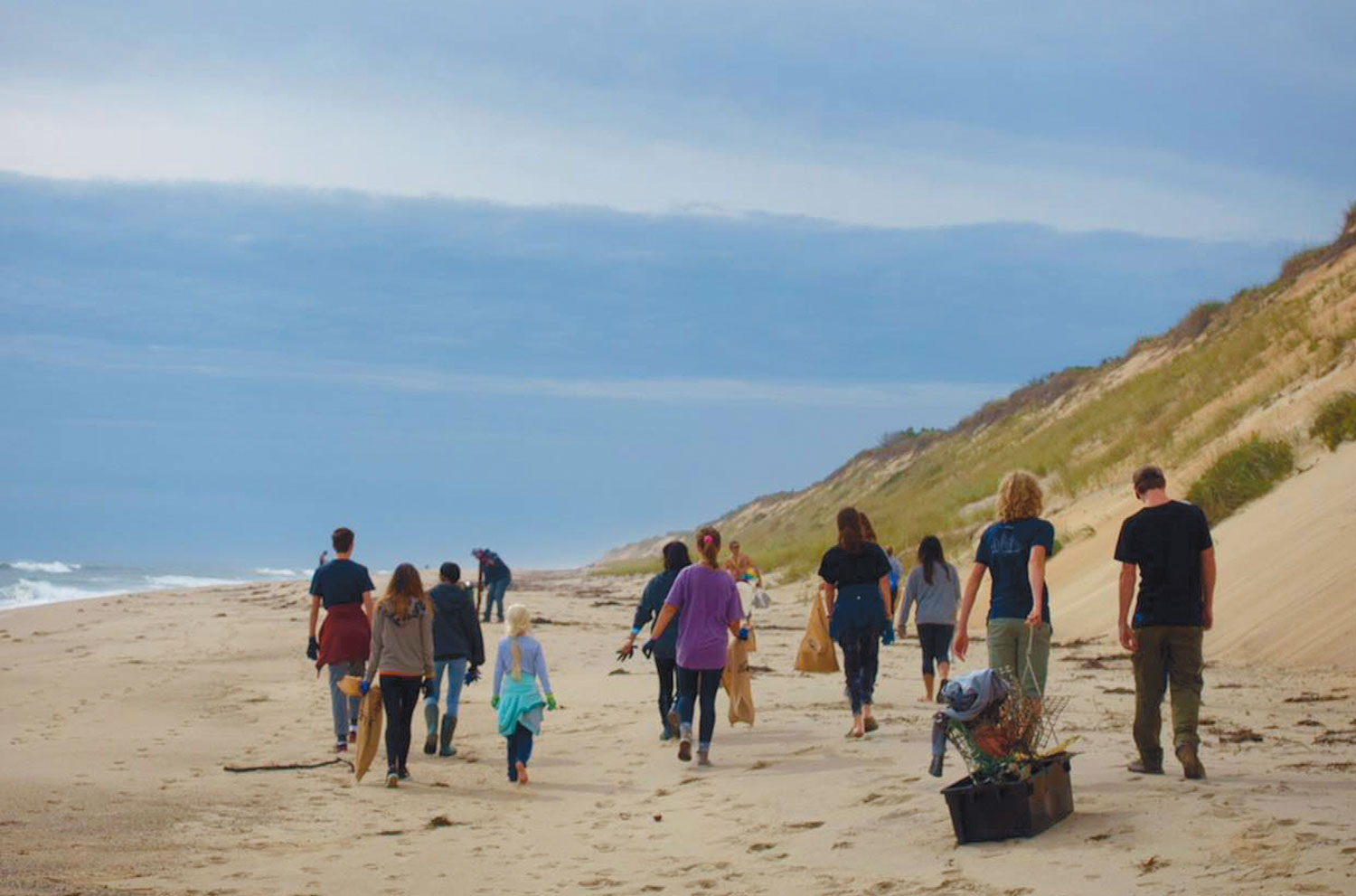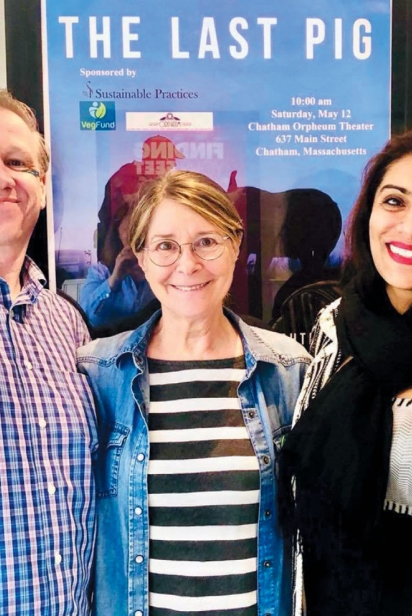Sustainable Practices
ADVOCATING FOR CONSCIOUS CONSUMPTION
Madhavi Venkatesan has a vision for the spring of 2019: have a petition on the warrant of every Cape Cod town meeting for residents to vote on banning the government procurement of single-use plastic-bottled beverages. This would prohibit their purchase by local agencies, municipal offices and schools, at the town, regional and county level, effectively putting an end to vending machines dispensing plastic bottles of water, sports and soft drinks in those locations. “We can get the entirety of Barnstable County behind this and show all of America,” Venkatesan says.
Venkatesan’s impressive list of credentials—multiple master’s degrees in Economics, Sustainability and Environmental Law, a PhD, and a Fulbright—is surpassed by the tremendous enthusiasm and commitment she feels for the causes she backs. Currently in her second year as a professor at Northeastern University in Boston, Venkatesan came to teaching circuitously following a rigorous career in investor relations for three Fortune 250 companies, most recently focused on social responsibility.
Rather than divesting our interests in a company that may have questionable sustainability, social and environmental practices, she urges us to join our voices to form voting blocks that will cause genuine change within that entity. “For example, insurance companies have huge financial holdings to generate revenues,” Venkatesan says. “We all need to consider what we are indirectly supporting. We need to be come activist investors. We need to get loud!”
A visitor who had enjoyed past visits to the Cape, when Venkatesan made Brewster her year-round base in 2007, it became her goal to inspire action in both residents and tourists alike. “We need to raise our standards here because this in not an environmental Disneyland,” she says. “This is our home.”
Venkatesan consulted with a pro bono legal team to establish a nonprofit named Sustainable Practices, now in its second year. “While the causes are worldwide, the most impact we can ever have is to act locally. The threshold for real change is at the grassroots level, where we can try to cause a shift in values,” says Venkatesan.
Sustainable Practices launched a film series in 2017, offering public screenings of environmentally relevant documentaries to the public for $10, with discussion following each film. A Plastic Ocean was the first in the bi-monthly schedule, followed by Chasing Coral, An Inconvenient Sequel: Truth to Power, and The Last Pig, by local producer/director Allison Argo. Launching the series with a grant, Venkatesan earmarked those monies for leasing the Chatham Orpheum Theatre on Saturday mornings when the space was vacant.
By the second film, the Orpheum’s Executive Director, Kevin McLain, had signed the theatre on as Sustainable Practices’ first financial backer, pledging them his theatre the first Saturday of the month to show the film series without a venue cost. Venkatesan has personally covered the other expenses of the non-profit, like website development and film rental fees.
Now in its second year, the Sustainability Film series has grown to be a monthly event. Spanning September through May, the 2018- 2019 list will showcase nine films, including The True Cost, detailing the human and environmental cost of the clothing industry; a repeat screening of A Plastic Ocean, showing the impact of plastic on marine ecosystems and human health; Wasted, the Anthony Bourdain-produced story of food waste; and The Island and the Whales, documenting the Faroe Islands indigenous people’s relationship with pilot whales as a primary food source with an increasingly dangerous mercury content, scheduled in December. With recent film attendance growing, ticket sales have exceeded costs, nudging Sustainable Practices’ ledger into the black.
Divide in Concord, a documentary which details the leadership of then-84-year-old resident Jean Hill, who lead the fight in her Massachusetts hometown to ban commercial water bottles (one of the first in our nation), was one of the impetuses that led Venkatesan to initiate a similar campaign here on the Cape.
To grow support for the cause, Venkatesan launched screenings of Divide in Concord in 15 town libraries Capewide in the spring of 2018. Conservation-minded folks, as well as the curious, watched together, learning, discussing, and hopefully building momentum for this spring’s town meeting vote.
It is well known how damaging plastic- containing BPA and phthalates can be to our health when we consume those compounds that leach into the contents of our plastic bottles. Perhaps only 10-20% of plastic bottles purchased in America are recycled, and there is no longer a market for our used plastics. Even those items that are recycled present the ironic reality; more virgin plastic must be created to combine with the recycled plastic to render it useable. Bottles overwhelmingly find their way to the ocean depths once they fill and sink to the bottom, and perhaps may rest there indefinitely without sunlight for the lengthy approximately 450-year photodegradation process, which breaks down the plastic, to even begin.
Beverages packaged in glass bottles or boxes (like milk) would be allowed, but the emphasis would be on installing more municipal water ports for individuals to refill their stainless or glass bottles. Brewster already distributes such containers for free in the summer, and Wellfleet used a grant to install a refill station by their town playground across from Mayo Beach.
“Economists are trained to concentrate on market prices, but in our society we often only consider the costs that we pay, and ignore the externalities,” says Venkatesan. “We are very entitled, but we can’t have whatever we want without consequences. It’s not simply how do our purchases impact the world, but what do their ingredients do to us, how do their different components pollute the Earth long term and what waste do they cause from the moment of consumption onwards?”
Earlier this year, on September twenty-third, Sustainable Practices organized an all-town Cape beach cleanup. “We were so grateful for the support of our second financial backer, By-The-Bay Designs in Brewster, and the help from the non-profit 4Ocean,” says Venkatesan. “Many local walkers already patrol and collect beach debris, so the intent was not to gather as much trash as we could. We knew this would be an opportunity to assemble teams of liaisons, photographers and volunteers from many towns, an exercise in community building. We realize that historically Cape Cod’s town meetings are not always well attended; we need a base that, going forward, will spread the message and back the bottle ban.”
By early 2019 Venkatesan hopes to have cemented this goal of community engagement. Ten signatures are needed in each town to have the bottle ban placed on the town ballots. Although she would love to have the issue pass unanimously in every town, even getting it on the ballot Cape wide would be a tremendous achievement. She says, “with massive publicity behind our push, we could effect a simultaneous connected action all over the Cape!”
Sustainable Practices is also calling for entries in their film contest, which is open to all non-professionals in Barnstable County. Film makers are asked to produce a thirty-second to one-minute Public Service Announcement (PSA) or a short, a film of two to five minutes, in one of six areas of environmental responsibility: water, waste, transportation, food, energy and open space/ecosystems. With a December 31st deadline, there is still time for people of any age to submit their entries.
On February 2, 2019, the winning films will debut on the big screen at the Chatham Orpheum Theatre, with their creators awarded a “Steward”, Sustainable Practices’ version of the Oscars. Sculpted in bronze by Robert Marcus of Chatham, one award will be handed out to recognize the best filmmaker in each of the two designations: the PSA and the Short film.
Venkatesan believes it’s a time for all of us to consider poverty and our own consumption. We need to understand things like what low prices really mean, and what they do to the Earth, and also how each of us spends not only our dollars, but our time. What can we each do to make a difference? Venkatesan says, “to me, sustainability means a responsibility for the future, and not just the financial future. Are we not the government; by the people and for the people?”
Venkatesan recalls cornerstone moments of the past few years’ journey: achieving non-profit status; securing their first financial partners; launching the two film series and a film contest; and receiving social media attention, even coverage of The Cape Plastic Bottle Ban by Boston 25 News. Thrilled with the public’s reception of the group’s initiatives so far, Venkatesan believes Sustainable Practices is achieving its mission goals of education, involvement and communication. “Now, it’s up to each one of us to connect the dots,” she says.
2018-2019 Sustainable Film Series
December 8 The Island of the Whales (theislandsandthewhales.com)
January 6 One Big Home (onebighome.com)
February 3 This is Home (gidalyapictures.com/this-is-home)
March 3 Death by Design (deathbydesignfilm.com)
April 6 The Devil We Know (thedevilweknow.com)
May 5 A Dangerous Idea (vimeo.com/290824412)
June 2 Sacred Cod (sacredcodfilm.com)






